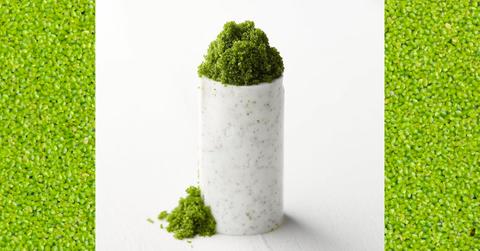This Wanna Greens Product Features the World's Smallest (and Cutest) Vegetable (Exclusive)
"Despite its tiny size, it boasts an exceptional nutrient profile and higher levels of iron, zinc, and potassium than common green vegetables."
Published May 24 2024, 1:09 p.m. ET

Miniature foods are beloved for their adorable appearance, spawning YouTube channels like Jenny's Mini Cooking Show and series like Tiny Kitchen Cook-Off. Typically, viral tiny foods are in the form of meals. But as it turns out, Mother Nature is pretty good at "cooking up" her own tiny foods, and the world's smallest vegetable might just turn you into the "face holding back tears" emoji.
Exclusively shared with Green Matters, Dr. Tsipi Shoham, PhD, the co-founder, CEO, and board member of GreenOnyx— a company "reshaping the seed-to-plate journey to secure fresh nutrition for all" — claims duckweed, known as a water lentil, is considered "the world's smallest and fastest-growing fresh vegetable."
The "super-fresh" food company provides fresh Wolffia vegetables via its flagship product, Wanna Greens.

Dr. Tsipi Shoham, PhD
We spoke exclusively via email with Dr. Tsipi Shoham about "nature's unsung heroes," aka the smallest veggie on our planet. With over two decades of medical research, specifically in cellular biology and cancer research, Dr. Shoham strongly believes fresh greens "promote cellular strength, prevent illness and disease, and promote longevity," as per the GreenOnyx site.
Read on to learn about the nutritious magic of these miniature pea-like lentils.
Could water lentils be the world's smallest vegetable?
Wolffia vegetables — sometimes called Asian watermeal or Mankai duckweed — measure about one millimeter in size, reproduce asexually, and are often crowned as nature's tiniest vegetable. According to Food Republic, duckweeds exist within the subfamily Lemnoideae of the Araceae family, alongside flowering plants like Jack-in-the-pulpit, calla lilies, and philodendrons.
Wanna Greens cultivates natural strains from the Wolffia arrhiza (native to Europe, Africa, and both temperate and tropical Asia) and Wolffia globosa species (native to tropical and subtropical Asia).
Mental Floss wrote Wolffia globosa is the smallest flowering plant on Earth, though it rarely flowers. Seen carpeting near-still freshwater bodies of water, the flower of this species produces what is believed to be the world's smallest fruit.
"Despite its tiny size, it boasts an exceptional nutrient profile and higher levels of iron, zinc, and potassium than common green vegetables," Dr. Tsipi Shoham tells Green Matters.
According to the company, the freshwater lentils feature 45 percent protein, more zinc than broccoli or kale, more iron than spinach (though spinach being a nutritional iron-rich hero is essentially an exaggeration popularized by Popeye the Sailor, but that's beside the point), and more potassium than any other green veggie.
"Each tiny sphere of Wanna Greens is a whole living plant, ensuring maximum freshness and vitality with a shelf life of up to six weeks, thanks to the sterile growing technology that GreenOnyx has developed. This technology also means that they are free from pathogens, pesticides, and antibiotics," Dr. Shoham continues.
Water lentils are still considered a "new superfood," a term loosely mentioned in a January 2024 Forbes piece. A 2021 study published in EFSA Journal noted that Wolffia vegetables have long been used for human consumption in South and Southeast Asia.
Other parts of the world haven't caught on until recently simply "due to the negative effect of the oxalic acid content on the taste and the difficulty to separate associated organisms from the original crop when grown under non‐controlled conditions," as written in the 2021 study, which cited 1999 research by Sascha Iqbal.
Dr. Shoham relays that Wanna Greens is "the only producer of fresh duckweed approved by the FDA, EFSA, and MoH."
What do water lentils taste like?
We've seen photos of water lentils adorning everything from quinoa bowls to ice cream. So, what kind of flavor profile do these little green guys have?
"Wanna Greens has a mild flavor that complements any dish without overpowering it. Eating them raw is the preferable and healthiest way," Dr. Shoham says.
And while Wanna Greens won't be available to the public to purchase until "later in 2024," the product has been featured at restaurants like NYC's 11 Madison Park and Paris's Lucas Carton.
Is water lentil agriculture considered sustainable?
The Food Network mentioned that water lentils are actually easier to grow than soy, as no farmland is needed for production. Plus, according to Wanna Greens, certain species of water lentils are used for "water remediation," noting they can absorb nitrogen and phosphorus surpluses, helping to purify the water in the process.
We asked Dr. Shoham to expand on the sustainable nature of Wanna Greens specifically.
"GreenOnyx has established a sterile, autonomous supply chain that significantly shortens the path from farm to table, ensuring fresh nutrition and enhancing the resilience and sustainability of our food systems," she explains. "GreenOnyx has achieved a near-zero-waste agriculture, maintaining freshness for up to six weeks while utilizing minimal arable land, space, water, and energy. ... This pollution-free, climate-agnostic system eliminates the need for arable land and prevents environmental damage."
Suddenly, we're feeling green ... and hungry.